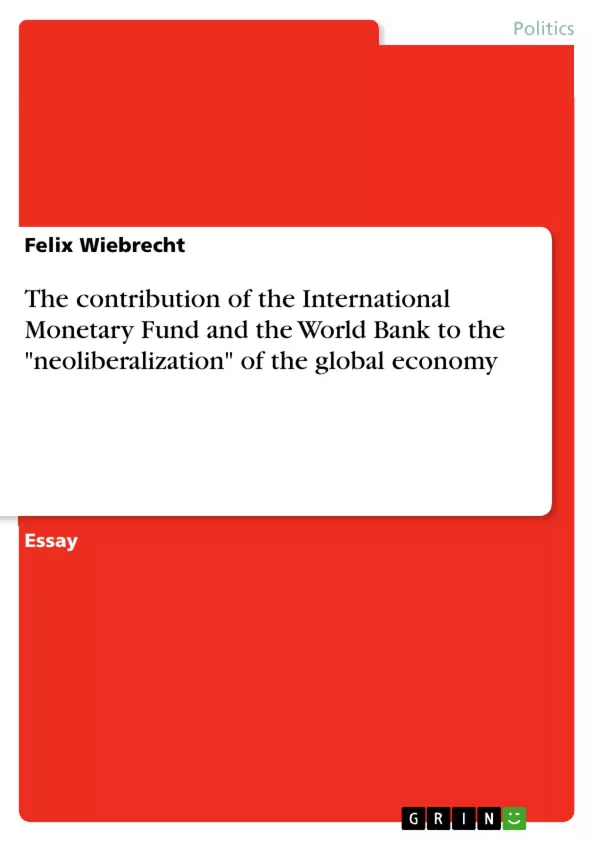To what extent has the International Monetary Fund and the World Bank contributed to the 'neoliberalization' of the global economy?
Inhaltsverzeichnis (Table of Contents)
- Introduction
- Neoliberalism: Definition and Characteristics
- IMF and World Bank Policies: A Neoliberal Approach
- Cutting State Expenditures
- Abolishing Subsidies
- Increasing State Income
- Privatization of State Enterprises
- Free Trade and Deregulation
- Conclusion
Zielsetzung und Themenschwerpunkte (Objectives and Key Themes)
This paper aims to examine the claim that the International Monetary Fund (IMF) and the World Bank have contributed to the "neoliberalization of the global economy." It first defines and characterizes neoliberalism before analyzing the policy recommendations of the IMF for developing countries. The paper aims to demonstrate that these policies align with the neoliberal ideology.
- The role of the IMF and World Bank in shaping the global economy
- The definition and characteristics of neoliberalism
- The impact of IMF policies on developing countries
- The relationship between IMF policies and neoliberal ideology
- The influence of the Washington Consensus on IMF policies
Zusammenfassung der Kapitel (Chapter Summaries)
The paper begins by defining neoliberalism, highlighting its emphasis on individual freedoms, free markets, and limited government intervention. The paper then delves into the specific policy recommendations of the IMF, focusing on their impact on developing countries.
The paper explores several aspects of IMF policies, including:
- Cutting state expenditures: The paper examines how the IMF encourages austerity measures in developing countries, such as reducing government spending on social services and welfare programs. Examples from countries like Mongolia, Mexico, Colombia, and Cote d'Ivoire are provided.
- Abolishing subsidies: The paper discusses how the IMF advocates for the removal of subsidies, using Argentina as an example where export subsidies were abolished to attract foreign investment.
- Increasing state income: The paper highlights how the IMF promotes tax increases and other measures to boost government revenue. Examples include the introduction of a General Sales Tax (GST) in Sierra Leone and the IMF's suggestion to raise the pension age in the Kyrgyz Republic.
- Privatization of state enterprises: The paper examines the IMF's recommendation to privatize state-owned enterprises to generate short-term income for governments. Mexico is used as an example, where various public enterprises were sold off.
- Free trade and deregulation: The paper discusses how the IMF encourages free trade and deregulation, citing the example of Mexico's signing of the North American Free Trade Agreement (NAFTA).
Schlüsselwörter (Keywords)
Key terms and concepts explored in this paper include neoliberalism, International Monetary Fund (IMF), World Bank, Structural Adjustment Programs (SAPs), Washington Consensus, fiscal austerity, privatization, trade liberalization, deregulation, and developing countries.
Frequently Asked Questions
How have the IMF and World Bank contributed to neoliberalization?
By promoting policies such as privatization, deregulation, and fiscal austerity in developing countries, which align with neoliberal economic ideology.
What is the "Washington Consensus"?
It refers to a set of free-market economic policy recommendations for developing countries that became the standard approach for the IMF and World Bank.
What does "fiscal austerity" mean in IMF terms?
It involves cutting state expenditures, often on social services and welfare, to reduce government deficits and attract foreign investment.
Why is privatization a key neoliberal policy?
Privatization transfers state-owned enterprises to the private sector to generate short-term income and theoretically increase market efficiency.
What are Structural Adjustment Programs (SAPs)?
SAPs are loans provided by the IMF and World Bank to countries in economic crises, conditional on the implementation of neoliberal reforms.
- Quote paper
- Felix Wiebrecht (Author), 2014, The contribution of the International Monetary Fund and the World Bank to the "neoliberalization" of the global economy, Munich, GRIN Verlag, https://www.grin.com/document/277316



